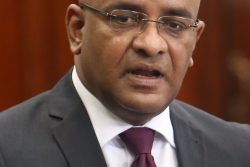At the beginning of the month, it was announced that John Howard, the former Australian prime minister, was the Australia and New Zealand candidate for the post of president of the International Cricket Council (ICC) from 2012 and that this would be confirmed by the ICC in June.
The nomination has however not been without controversy. Apart from his political credentials, with some claiming for him diplomatic skills because of his role as an international leader, all increasingly important in the world of modern corporate governance – and sport is no exception – Mr Howard cannot boast any commensurate experience or achievements on the cricket field or in the cricket boardroom. Indeed, his only claim to cricketing fame would appear to be that he is a self-confessed “cricket tragic”. In other words, his love of the great game is not matched by his playing ability.
Using this narrow definition of the term, many of us cricket lovers in the Caribbean would probably qualify as “cricket tragics” as well. But let us take a broader view.
Some 15 years ago, Australia defeated the West Indies in the Caribbean, confirming that the regional team was no longer the all-conquering force of old, even though the writing on the proverbial wall, from Sabina Park to dear old Bourda, had been discernible for a couple of years already. Now, the West Indies are bottom-feeders among major cricketing nations.
Even Zimbabwe – and this is not meant to disrespect the visitors who came and gave a good account of themselves – were, painfully to West Indian eyes, no pushover. In fact, Zimbabwe gave the West Indies and their loyal fans a major scare by winning the first of the one-day internationals (ODIs) and never allowing the West Indies batsmen to dominate a series remarkable only for the slow-paced, spinner-friendly pitches on offer and the vulnerability of most of the West Indians to spin bowling. To make matters worse, Zimbabwe won the preliminary T20 match preceding the ODIs, significant if only it proved that the attention span of this current crop of West Indians is challenged even by the shortest and least demanding format of the game.
Notwithstanding the passion for cricket that still exists in these parts – so brilliantly captured by Dave Martins in his column last Monday, “Cricket in the blood” – it is a little sad that some of us have exulted over the West Indies’ series victory, the team’s first in ODIs in two years. Even the captain, Chris Gayle, not the most compelling or articulate of skippers, was, as reported in this newspaper on Tuesday, “finding it hard to admit that his side was pretty unconvincing in winning four of the five matches”. The more appropriate reaction should have been relief, if not embarrassment, so turgid was some of the cricket played by the West Indies, in spite of the occasional flashes of brilliance.
Admittedly, especially for those of us who want still to believe that the West Indies have it within themselves to recapture the glory days, there is a new coach who seems to be only too well aware of the challenges he faces (Ottis Gibson); there is genuine youthful talent and potential (Adrian Barath, Darren Bravo, Kemar Roach); there is dynamism (Dwayne Bravo, Fidel Edwards when fit and Chris Gayle when he lets his bat do the talking); there is evidence of commitment (Narsingh Deonarine and Darren Sammy); but there is only consistency in the person of Shivnarine Chanderpaul and he is perhaps, as he approaches the age of 36 – whisper it softly – nearing the end of his illustrious career. And this lack of consistency is the fatal flaw in the character of West Indies cricket.
Following last year’s Test series victory against England, almost exactly a year ago, we wondered whether the West Indies had really turned the fabled corner (SN, 13th March 2010, “West Indian pride restored”). Disappointingly, the ingrained and chronic ineptness of the West Indies Cricket Board led by Julian Hunte (another politician and sometime diplomat), the militancy of the West Indies Players’ Association, which continues to agitate for better employment terms for its members, though their arguments are eroded with each successful failure, dubious selections, the inability to nurture young talent and the distractions of T20’s lucre appear to be keeping the players themselves in a perpetual state of unreadiness and inconsistency when it comes to representing the West Indies.
Until the pieces fall into place and a turnaround can be achieved through a massive effort by all concerned in the stewardship of West Indies cricket, a disillusioned public will continue to drift away from our regional game, our erstwhile pride and joy, taking refuge more and more in the glories of the past. It is therefore not too fanciful a notion to think that many of us are perhaps in danger of becoming the ultimate “cricket tragics”, our love for our team and the legacy they should embody betrayed by a lack of vision, mismanagement and underperformance.





